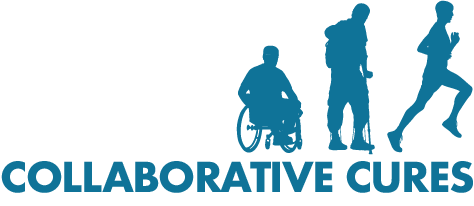Collaborative Cures Origins
When Mark Pollock broke his back in 2010, he discovered that spinal cord injury strikes at the very heart of what it means to be human. It turned him from his upright, running, jumping form into a seated compromise of himself.
He learned that it’s not just the lack of feeling and movement, it also interferes with the body’s internal systems that are designed to keep people alive. Multiple infections, neuropathic pain and uncontrollable spasms are common. These are the things that exhaust even the most determined. And, along with fundamentally impacting quality of life, it comes with €4 million average lifetime cost of care, there are huge barriers to getting back to work, and premature death is inevitable.
As Mark lay in hospital for 16 months, digesting the impact of his accident, he was physically and mentally broken. Yet, in the midst of the uncertainty, he began to turn his attention to curing paralysis. When he was released from hospital, he committed to donating his paralysed body to experimental research at the intersection where humans and technology collide, initially in aggressive physical therapy, robotic exoskeletons and trans-cutaneous spinal stimulation.
Since 2011, Mark and his fiancée, Simone George, have been involved in catalysing collaborations that are now valued at over $100 million. These include co-creating international neuro-modulation and robotics research studies; building an exoskeleton rehabilitation programme; facilitating multi-stakeholder relationships towards the commercialisation of academic research; and working alongside Wings for Life Spinal Research Foundation and the Christopher and Dana Reeve Foundation.
Combining that experience with initiatives with the World Economic Forum’s Young Global Leaders and work carried out in partnership with The Dock, Accenture’s flagship R&D and Global Innovation Centre, our research has identified 4 primary building blocks to create the conditions for collaboration and mitigate against systemic fragmentation.

Embodying Collaborative Leadership
Creating a culture of collaboration needs people to lead by example. It demands leaders being visibly and tangibly open to collaboration.

Incentivising Collaborative Behaviour
Incentives beyond funding are required to drive collaborative behaviours including rewards for sharing scientific data and communicating openly. It involves recognising and rewarding collaboration.

Mission Orientated Framing
Establishing a shared mission that multiple parties can sign up to is essential for creating the conditions for collaboration. It requires concrete, measurable and achievable outcomes.

Active Governance
Establishing proactive and appropriate levels of oversight is fundamental to allow collaborative projects to deliver. It requires robust structures to help build credibility and trust.
Using these four building blocks, Collaborative Cures was established in 2020 to scale Mark Pollock’s work to bring people together to cure paralysis in our lifetime. The organisation’s approach can be viewed on the Strategy page of this website: click here
